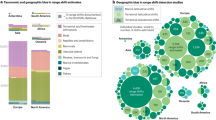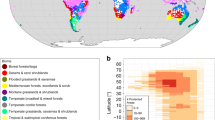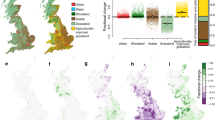Abstract
Managed relocation is a controversial climate-adaptation strategy to combat negative climate change impacts on biodiversity. While the scientific community debates the merits of managed relocation1,2,3,4,5,6,7,8,9,10,11,12, species are already being moved to new areas predicted to be more suitable under climate change13,14. To inform these moves, we construct a quantitative decision framework to evaluate the timing of relocation in the face of climate change. We find that the optimal timing depends on many factors, including the size of the population, the demographic costs of translocation and the expected carrying capacities over time in the source and destination habitats. In some settings, such as when a small population would benefit from time to grow before risking translocation losses, haste is ill advised. We also find that active adaptive management15,16 is valuable when the effect of climate change on source habitat is uncertain, and leads to delayed movement.
This is a preview of subscription content, access via your institution
Access options
Subscribe to this journal
Receive 12 print issues and online access
$209.00 per year
only $17.42 per issue
Buy this article
- Purchase on Springer Link
- Instant access to full article PDF
Prices may be subject to local taxes which are calculated during checkout



Similar content being viewed by others
References
McLachlan, J. S., Hellmann, J. J. & Schwartz, M. W. A framework for debate of assisted migration in an era of climate change. Conserv. Biol. 21, 297–302 (2007).
Hoegh-Guldberg, O. et al. Assisted colonization and rapid climate change. Science 321, 345–346 (2008).
Fazey, I. & Fischer, J. Assisted colonization is a techno-fix. Trends Ecol. Evol. 24, 475–475 (2009).
Hunter, M. L. Climate change and moving species: Furthering the debate on assisted colonization. Conserv. Biol. 21, 1356–1358 (2007).
Ricciardi, A. & Simberloff, D. Assisted colonization is not a viable conservation strategy. Trends Ecol. Evol. 24, 248–253 (2009).
Sandler, R. The value of species and the ethical foundations of assisted colonization. Conserv. Biol. 24, 424–431 (2010).
Schlaepfer, M. A., Helenbrook, W. D., Searing, K. B. & Shoemaker, K. T. Assisted colonization: Evaluating contrasting management actions (and values) in the face of uncertainty. Trends Ecol. Evol. 24, 471–472 (2009).
Seddon, P. J. et al. The risks of assisted colonization. Conserv. Biol. 23, 788–789 (2009).
Richardson, D. M. et al. Multidimensional evaluation of managed relocation. Proc. Natl Acad. Sci. USA 106, 9721–9724 (2009).
Sax, D. F., Smith, K. F. & Thompson, A. R. Managed relocation: A nuanced evaluation is needed. Trends Ecol. Evol. 24, 472–473 (2009).
Schwartz, M. W., Hellmann, J. J. & McLachlan, J. S. The precautionary principle in managed relocation is misguided advice. Trends Ecol. Evol. 24, 474–474 (2009).
Mueller, J. M. & Hellmann, J. J. An assessment of invasion risk from assisted migration. Conserv. Biol. 22, 562–567 (2008).
Willis, S. G. et al. Assisted colonization in a changing climate: A test-study using two U.K. butterflies. Conserv. Lett. 2, 46–52 (2009).
Fox, D. Conservation Vol. 8 (Society for Conservation Biology, 2007).
Walters, C. J. & Hilborn, R. Ecological optimization and adaptive management. Annu. Rev. Ecol. Syst. 9, 157–188 (1978).
Holling, C. S. Adaptive Environmental Assessment and Management (Blackburn Press, 1978).
Hughes, L. Biological consequences of global warming: Is the signal already apparent? Trends Ecol. Evol. 15, 56–61 (2000).
Pounds, J. A., Fogden, M. P. L. & Campbell, J. H. Biological response to climate change on a tropical mountain. Nature 398, 611–615 (1999).
Root, T. L. et al. Fingerprints of global warming on wild animals and plants. Nature 421, 57–60 (2003).
Parmesan, C. Ecological and evolutionary responses to recent climate change. Annu. Rev. Ecol. Evol. Syst. 37, 637–669 (2006).
Parmesan, C. & Yohe, G. A globally coherent fingerprint of climate change impacts across natural systems. Nature 421, 37–42 (2003).
Walther, G. R. et al. Ecological responses to recent climate change. Nature 416, 389–395 (2002).
Levy, M. et al. Millennium Ecosystem Assessment, 2005 (Island Press, 2005).
Hooper, D. U. et al. Effects of biodiversity on ecosytem functioning: A consensus of current knowledge. Ecol. Monogr. 75, 3–35 (2005).
Thomas, C. D. et al. Extinction risk from climate change. Nature 427, 145–148 (2004).
Sutherland, W. J. et al. A horizon scan of global conservation issues for 2010. Trends Ecol. Evol. 25, 1–7 (2010).
Butchart, S. H. M., Stattersfield, A. J. & Collar, N. J. How many bird extinctions have we prevented? Oryx 40, 266–278 (2006).
Durner, G. M. et al. Predicting 21st century polar bear habitat distribution from global climate models. Ecol. Monogr. 79, 25–58 (2009).
Peterson, G. et al. Uncertainty, climate change, and adaptive management. Ecol. Soc. 1, 1–7 (1997).
Puterman, M. L. Markov Decision Processes: Discrete Stochastic Dynamic Programming (Wiley, 1994).
Acknowledgements
This work was supported by a CSIRO Julius Career Award to T.G.M.; E.M-M. was supported by an OCE Fellowship from CSIRO, Queensland International Fellowship and an ARC APD Fellowship. H.P.P. was supported by an ARC Federation Fellowship. This work was further supported by the ARC Centre for Excellence in Environmental Decisions. We thank S. Ferrier, S. McIntyre, I. Chades and J. Nichols for comments on this manuscript and the late S. Schneider for his insights on this work.
Author information
Authors and Affiliations
Contributions
E.M-M., T.G.M., M.C.R. and H.P.P. designed the research. M.C.R. and E.M-M. carried out the analysis. E.M-M., T.G.M. and M.C.R. wrote the paper. All authors discussed the results and edited the manuscript.
Corresponding author
Ethics declarations
Competing interests
The authors declare no competing financial interests.
Supplementary information
Supplementary Information
Supplementary Information (PDF 444 kb)
Rights and permissions
About this article
Cite this article
McDonald-Madden, E., Runge, M., Possingham, H. et al. Optimal timing for managed relocation of species faced with climate change. Nature Clim Change 1, 261–265 (2011). https://doi.org/10.1038/nclimate1170
Received:
Accepted:
Published:
Issue Date:
DOI: https://doi.org/10.1038/nclimate1170
This article is cited by
-
Optimizing targeted gene flow to maximize local genetic diversity: when and how to act under various scenarios of environmental change
Conservation Genetics (2023)
-
A new dynamic score function approach to optimize a special class of Pythagorean fuzzy transportation problem
International Journal of System Assurance Engineering and Management (2022)
-
Learning about climate change uncertainty enables flexible water infrastructure planning
Nature Communications (2019)
-
Toward a Resilience-Based Conservation Strategy for Wetlands in Puerto Rico: Meeting Challenges Posed by Environmental Change
Wetlands (2019)
-
Site-based adaptation reduces the negative effects of weather upon a southern range margin Welsh black grouse Tetrao tetrix population that is vulnerable to climate change
Climatic Change (2019)



